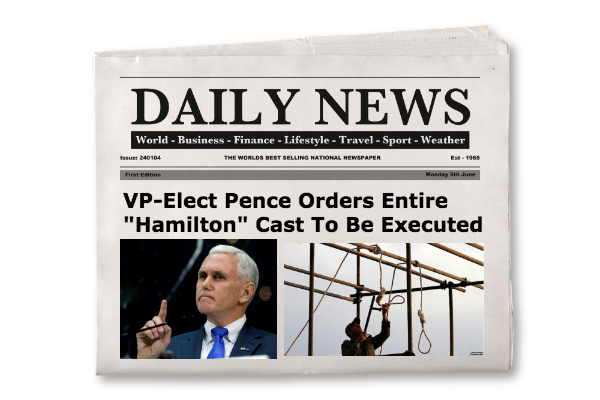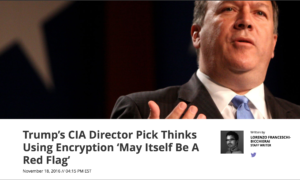The fifth horseman of the internet apocalypse is here. It changed the course of the election. It’s enabling Russia to control our minds. Behold the spectre of “Fake News” …and what helps “fake news” sites undermine our democracy? According to some, whois privacy.
Before this idea gathers too much steam I wanted to mention it here for two reasons:
A) To address an idea put forward that some kind of “Real Name Domain Registration Rules” (henceforth “Truenames” in this article) could help solve this, and
B) To make the point that “fake news” is not as cut-and-dry a topic as it may seem on the surface. Below are 5 points about this starting with how the “Truenames” idea relates to domain names and whois privacy and 3 through 5 address the concept of “fake news” itself.
1) The Truenames idea: there already is a policy that is supposed to address this, it’s the Whois Accuracy Program. It’s useless and accomplishes nothing. I was once cautioned “don’t dismiss a good idea because of bad execution”. Well in this case we have a bad idea, executed poorly and the result is the Whois Accuracy Program which accomplishes nothing more than knocking legitimate websites offline for no reason.
The only way to really implement a “true names” domain registration policy would be a total clampdown on the actual domain registration process, such as in person collection of government photo or biometric ID.
2) The role of Whois Privacy: Do you want to enforce verified identity on domain registrations or eliminate whois privacy or both? You could force “true names” and allow private whois, then the registrar can at least hand over accurate contact info under a due process. But eliminating whois privacy is a bad thing because there are numerous legit reasons for it (we were originally against Whois Privacy and then flip-flopped on it. Also see our comments to ICANN during their public comments period around this very issue).
Others have observed that few people know what a “whois lookup” is anyway. Implementing some combination of 1 & 2 above could only be achievable within an authoritarian framework, tantamount to what’s happening in China these days (that’s intended as a warning, not inspiration).
3) If we’re putting an onus on Registrars to force “true names” on domain registrations, what about forcing social network platforms to only allow sharing “of true facts” ? What a nightmare. Facebook and Google are already talking about penalizing “fake news sites” which obviously begs the question “who gets to define what a fake news site is?”
There is a widely circulated list compiled by a left-leaning liberal arts professor that contains websites which are definitely not “fake news” (such as easyDNS client, Zerohedge, whom occasionally publishes my own Rebooting Capitalism” analysis editorials), and straight up satire sites like “The Onion”. The list went viral, and at least one browser plug-in was created to alert the user when they are viewing a fake news site. The professor has since felt pressured to takedown her list citing harassment and doxing – which is not good for anybody.
Ron Paul came out with a “Fake news site” list of his own. This probably wasn’t what the mainstream media had in mind when they trotted out this bogeyman to explain away their own incompetence in their inability to foresee the unthinkable scenario of a certain recent election result.
4) Let’s call this for what it is: this “fake news” hysteria is actually a vendetta against free speech – full stop. Everybody here is allowed to say, print and write whatever the hell they want. (This includes Dr. Zimdars right to create and circulate her list).
It is the responsibility of everybody else to show some critical thinking ability and to employ basic reasoning skills and analysis to evaluate the veracity of what they are reading. “Question Everything” is a pretty good rule of thumb. “Trust but verify” is another. “Retweet anything” isn’t.
What shouldn’t happen out of everybody making up their own “enemies lists” is that no laws should be passed, or rules changed to force one particular “enemies list” onto anybody else. People should be free to subscribe to them, but they shouldn’t be arbitrarily subject to them.
The sensible approach which will likely (hopefully) shake out of all this is a meta-rating system of crowdsourced, reputational data which could be in a browser plug-in (there may already be something like this, the aforementioned browser plug-in is pointing in this direction).
A decent attempt at an MVP for such a system might include:
- Detect the mere presence of Whois Privacy. Yes whois privacy is valuable, but in certain contexts it can be a red flag. If I’m about to put my credit card number into an ecommerce site and I realize the domain has whois privacy enabled, I’m going to re-evaluate my calculus.
- Circular reference detection: Many shitstorms of “untruthiness” that go viral often trace their origins back to a single source being quoted, requoted in a widening, circular fashion. Real actual facts emerge from multiple points of origin, corroborating each other.
- Various user ratings and weightings which can help score or overlay a given document or search result.
The challenge here would be mitigating against gaming the system but ideally there will eventually be a myriad of choices in healthy competition. It also adds an entirely new level of nuance and complexity to online discourse, but this is the world we’re living in now. The old blunt instruments aren’t working anymore.
5) We are also forced at this point to differentiate between what the mainstream media calls “fake news” and “The Big Lie”:
“Fake News” are ostensibly hyperbolic fabrications coming from non-sanctioned, fringe media outlets. Here’s the reality: nobody changes their vote based on one of these stories. These things may get shared 3 million times but all they are doing is bolstering a preexisting confirmation bias. Nobody alters their belief structure when they read or share these things, they double down on them.
“The Big Lie” is something else. The Big Lie is a State tool disseminated via the mainstream approved media outlets. The Big Lie is repeated so often everybody believes them yet they are as fake as the “Pope Endorses Trump” clickbait from the former category. The most notable, least polarizing example I can use is “there be WMD in Iraq”, something everybody but the most ardent Neocon ideologue now knows was utterly, totally, false and that the mainstream press was actively complicit in furthering. It was The Big Lie that led to a criminal invasion and a war.
The final category of “fake news” is the null or empty set: “no news”. No coverage. If it’s not being talked about by the mainstream media then it doesn’t exist. These issues include the fact that we are all being surveilled by our governments, and that regardless of who won the U.S election this trend is on the increase – not only in the US but globally.
The most worrisome aspect about “Fake news” is that it’s being used as a justification to further invade our privacy and attack free speech (yet somehow, it’s not censorship?)
“We are going to have to rebuild within this wild-wild-west-of-information flow some sort of curating function that people agree to… There has to be, I think, some sort of way in which we can sort through information that passes some basic truthiness tests and those that we have to discard, because they just don’t have any basis in anything that’s actually happening in the world…That is hard to do, but I think it’s going to be necessary, it’s going to be possible”
— Barak Obama, speaking at White House Frontiers Conference, Oct 13, 2016
Conversely, The Big Lie machine is another example of the one-sided relationship with our Overlords. When they do it, it’s ok and is allowed to shape narrative of our culture, when some fringe site does it, it’s “dangerous fake news” and we’re gonna need a Ministry of Truthiness to protect the children from it.
Meanwhile, The “Empty Set” has the approved media channels omitting numerous stories from the public discourse – even stigmatizing them to the point where trying to raise the issue brands one a nutcase.
As always, the trending buzzword (in this case “fake news”) is an oversimplification designed to marginalize legitimate discourse orthogonal to The Establishment’s Official Reality and legitimize similar activity when perpetrated by it.




Leave a Reply